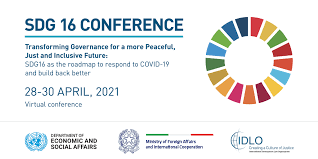
By Maria Santillana
The SDG16 Conference 2022 was organized by the United Nations Department of Economic and Social Affairs (UN DESA), the International Development Law Organization (IDLO) and the Government of Italy, with the aim to inform the upcoming 2022 High-Level Political Forum that will take place in July 2022. The hybrid event convened government, international organizations, civil society, academia and youth stakeholders from different continents to share their insight and advance policies and partnerships that intertwine goals and targets across the Sustainable Development Agendas.
The Conference examined the interlinked dimensions of peace, the rule of law, robust institutions, and leaving no one behind; and how a holistic perspective is essential to ensure that all areas are kept in sight. International IDEA’s Director of Global Programmes and Permanent Observer to the United Nations. Dr Massimo Tommasoli contributed to the discussion and deliberations during the thematic session on 'A new vision for the rule of law to address global challenges'.
 Image credit: International IDEA
Image credit: International IDEA
During his participation, Dr Tomassoli made the following remarks:
- The Covid-19 pandemic has exacerbated the challenges related to data gathering and analysis, especially at the peak of the initial phases, as highlighted by the Praia City Group on Governance Statistics.
- The pandemic has impacted on all the areas of SGD16, especially in terms of its significant effects on democracy, the rule of law, and human rights, as indicated in International IDEA’s report Taking Stock After Two Years of Covid-19. Data from International IDEA’s Global Monitor show that even the best pandemic responses had unintended negative consequences, falling disproportionately on the most vulnerable population in such areas as the use of emergency laws; restrictions on a range of freedoms; the impact on personal security and integrity; effects of the pandemic on women and minorities; and access to vaccines.
- The key lesson from the SDG16 Data Initiative—a consortium of partners active in the fields of peace, justice, and accountable institutions—is that the combination of official and non-official data provides an important contribution to the daunting task of monitoring progress on the 2030 Agenda for Sustainable Development, particularly in non-democratic contexts, where government data often suffer from a lack of transparency and are more likely to be biased.
- Data are an essential tool for implementing a holistic approach to building back better.
- Challenges include disinformation in statistics, a failed call for peace, conflict trends, high numbers of displaced people, and improving data collection for evidence-based policy responses grounded on renewed trust between people and the state.
During the two-day conference, participants took stock of the progress on SDG 16 as a fundamental underpinning of sustainable development, and the challenges and opportunities to promote more peaceful, just, and inclusive societies. Showcasing how Covid-19 has contributed to the root causes and drivers of conflict and instability, challenged the delivery of public services, threatened the rule of law, and increased inequality and exclusion. The discussion also featured innovations made in response to the pandemic, including approaches to build and sustain development in conflict-affected contexts, strengthen institutional resilience, promote people-centered justice, and address inequalities while leaving no one behind.
The conference raised the alarm about the further backsliding of SDG16+ and highlighted the importance of multi-dimensional efforts to shape post-pandemic strategies and policies. It established immediate action is required from all stakeholders to achieve the peaceful, just, and inclusive societies envisaged by SDG16. The key takeaways suggest holistic multistakeholder and multidisciplinary approaches will be essential to deliver on SDG16, as well as complete the 2030 Agenda.
Recording from the conference is available on Youtube: SDG 16 Conference 2022

ABOUT THE AUTHOR
ASSOCIATE PROGRAMME OFFICER
Maria Santillana
Santillana is an Associate Programme Officer at the Democracy Assessment (DA) Unit. Her work is focused on strategic communication, political analysis, outreach and coordination activities for the Global State of Democracy (GSoD) initiative, with a special regional focus on the Middle East and Latin America and the Caribbean. She is responsible for the communications and outreach efforts of the GSoD knowledge products and tools, monitoring and supporting the achievement of DA programme objectives through continuous results reporting.
People-centred governance in a post-pandemic world
https://www.idlo.int/SDG16Conference2022
The United Nations Department of Economic and Social Affairs, the International Development Law Organization, and the Government of Italy are organizing the SDG 16 Conference 2022, to be held from 21 to 22 April in a hybrid format. Building on the outcomes of the 2019 and 2021 editions and drawing on the insights of participants from government, international organizations, civil society, academia and youth, the Conference will explore how a people-centred approach to governance can help rebuild trust, accelerate progress towards sustainable development and tackle the challenges facing a post-COVID world.
The Conference will examine how COVID-19 has contributed to the root causes and drivers of conflict and instability, challenged the delivery of public services, threatened the rule of law and increased inequality and exclusion. It will highlight innovations made in response to the pandemic, including approaches to build and sustain development in conflict-affected contexts, strengthen institutional resilience, promote people-centred justice, and address inequalities while leaving no one behind.
Please note that due to COVID-19 related restrictions, there will be limited space at the conference venue. In-person participation therefore is by invitation only. Registration is required for online attendance.










Add new comment